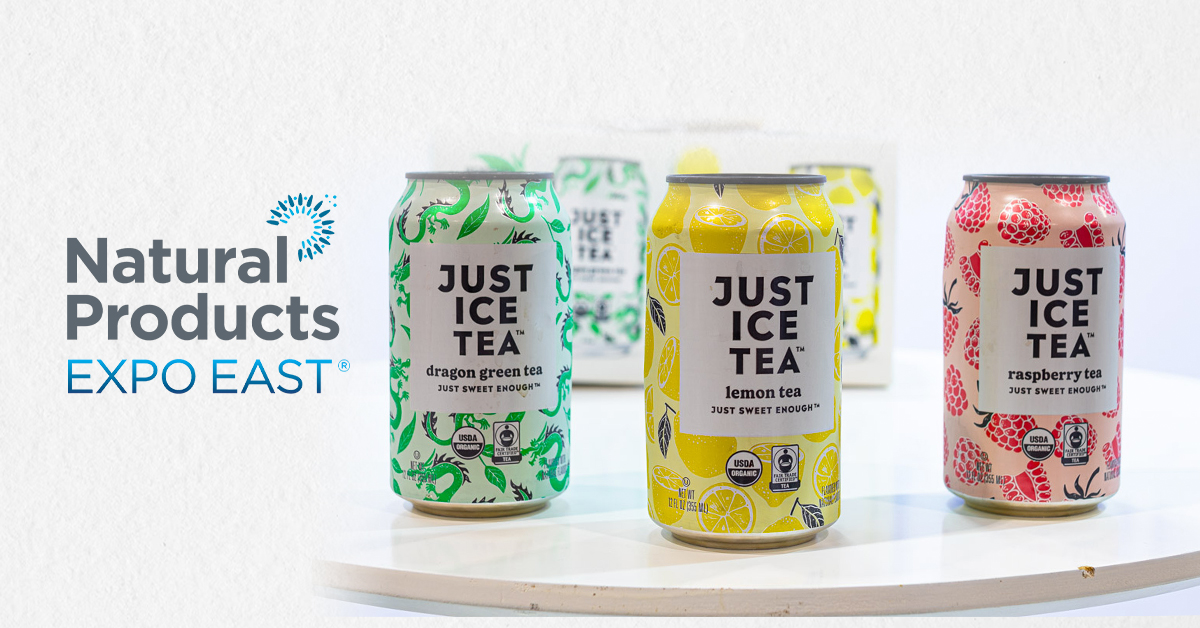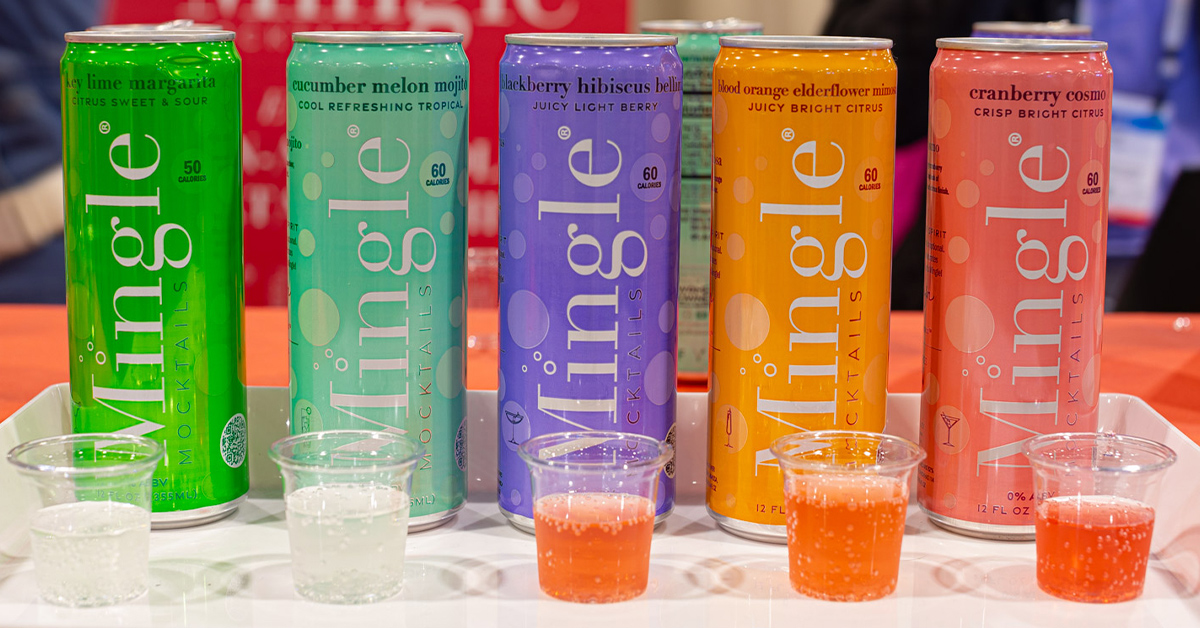Expo East may be over (forever 😢) but we’ve got stacks of notes and news from the show to bring you over the coming week. Here’s our post-event Monday dispatch, including news and updates from Just Ice Tea and Yesly, plus a look at the shifting priorities of next-gen alcohol-free beverages.
Eat the Change Grows Around Just Ice Tea
One year after the launch of Just Ice Tea, the better-for-you RTD tea brand created by Honest Tea founder Seth Goldman and his business partner Spike Mendelsohn, the brand has completely altered the direction of their company Eat the Change.
At the company’s Expo East booth, Goldman said that Just Ice Tea now accounts for 90% of Eat the Change’s sales and the brand has swiftly filled the void in natural channel retail left by The Coca-Cola Company’s decision to discontinue the Honest Tea brand. Barry Nalebuff, who co-founded Honest and now sits on Eat the Change’s board of directors, said that next year the company expects Just to reach the level of scale Honest Tea had at year 10.
Eat the Change was founded in 2020 as a better-for-you snack brand, producing lines of carrot chews (which have the gummy consistency of fruit snacks) and mushroom jerky. But with Just’s takeover of the company’s focus, Goldman said the brand has now discontinued the jerky line. The team, he said, remains confident in its Cosmic Carrot Chews brand and also unveiled rebranded packaging for the line at the show.
For Just Ice Tea, the brand debuted a new 12 oz. canned line of lightly sweetened still teas. Available in Lemon Tea, Raspberry and Dragon Green Tea, the drinks will be made with nitrogen for pressure stability (samples on the floor were not nitrogenated). Each can will retail for $1.99 and $7.99 per 4-pack – a price point that Goldman said is intended to make the drinks more accessible to lower income consumers as a “democratized” alternative to the brand’s premium-priced glass bottle core line.
While the company previously raced to get its flagship tea line out in the months following Coke’s announcement it would discontinue Honest Tea by the end of 2022, Goldman says the development of the cans was not quite as rushed with work on the line beginning about six months ago. The project also required the brand to open up new supply partners to source the cans, which feature printed labels and black tops to match the aesthetic of the glass bottle line’s black caps.
With the teas fast-eclipsing Eat the Change’s initial food products, Goldman said the brand has received additional investment to support the scale.
“We’re very fortunate to have supportive investors who believe in us and who see the opportunity, and frankly who we’ve worked with, so we’ve been able to make that happen quickly,” he said. “You do need it to grow. When you grow this fast, it does take inventory and there’s a lot of trade spend to get into stores. Our whole supply chain has been tremendously supportive.”
More Non-Alc Consumers Driving Call For Better Merchandising In NA Set
The Adult Non-Alcoholic Beverage Association (ANBA) believes the emerging category deserves more attention from grocery retailers and distributors, and they came to Expo East armed with the data that they say proves it.
The industry association, launched in late 2021, made its presence felt at this year’s fall trade show: of the over 30 non-alc brands exhibiting at the show, 15 were part of ANBA’s sponsored pavilion section inside the convention center. The general sentiment heard from non-alc brands both inside and outside the pavilion was enthusiasm about the category gains achieved over the last year.
Back to that ANBA data: According to NielsenIQ data presented by ANBA CEO Marcos Salazar during an Expo-hosted panel discussion on merchandising, non-alc beverage sales were about $510 million in the last 52-week period ending July 29, up 31.2% versus a year ago. Yet, the category’s sales represent 0.6% of total alcohol.
The question discussed by nearly all the NA brands was how to build the category further in retail. The answer was varied depending on product type and format. While NA beer, wine and spirits generally preferred to be on-shelf next to or within the same section as their alcoholic counterparts; RTDs like Mingle Mocktails stated that they did very well in the mixer category and individually in cold cases driving trial.
But the booze-free brands were in agreement on one key point: grocery retail needs to fully embrace the category and give non-alc a dedicated set in the store.
“What we’re pushing for is just driving awareness,” Salazar told BevNET. “The category works better when we are in a set.”
As a whole, more growth and diversity is seen as an advantage within the space. Most brands said that oversaturation was not a concern at the moment and, if anything, more brands translated to more opportunity for retailers to build dedicated shelf space within the NA set.
The difficulty is that – just as in their full-strength counterparts – not all beverage alcohol is the same and are often found in not only different places in the store but, depending on state laws, can be limited to which stores they are even allowed to be sold in.
In the case of non-alcoholic wine, ideally it could be in the wine stores but, in New York State for example, wine and liquor can only be sold in stores that sell alcoholic beverages over 6% ABV. This means Sovi, Seraphim, Grüvi and other low-to-no wine companies can’t be on-shelf in the places where New York wine drinkers shop.
What has been changing, especially in the last year, is that bigger players are taking notice of the category and realizing that not jumping on the sober beverage bandwagon means leaving opportunity on the table.
Multiple brands expressed optimism that Walmart and Target may be in the process of dedicating category managers solely to the zero-proof beverages. Additionally, as Dry January approaches NA companies are expecting not only an even bigger bump in sales from last year but the potential for a change in strategy from distributors and retailers.
Yesly: Fundamentals Fueling DSD Growth, Target Trial Next
Yesly CEO Scott Miller is pulling from the playbook of his days running Snapple and Essentia by building his newest beverage brand Yesly through regional DSDs while eyeing mainstream retailers, starting with a forthcoming trial in Target.
The enhanced canned water brand hit stores in Q1 this year and has quickly accrued a growing list of DSD partners throughout the country. For now, Yesly is distributing its flavored, functional water with about 20 DSDs but is looking to build out that network to around 200 partners in the next 24 months.
For a new product trying to get recognition, DSDs serve as the “brand’s ambassadors” and are “mission critical” to the long term success of the company by merchandising with retailers, building displays and preventing out of stocks, Miller said. “It’s really smart. The DSD is in the store day-to-day and can really do the reps and manage your brand.”
Although Yesly is focused on going to market with DSD, it will use broadline distribution when needed. The approach reflects an emphasis on “strong fundamentals” as the foundation of long-term growth, Miller said, with Yesly being purposefully built “brick-by-brick” in a variety of retailers.
Yet, for a brand that is less than a year old, it doesn’t appear to be moving slowly. It has solidified DSD coverage all over the country from Classic Beverage in Southern California to Big Geyser in New York and expansion recently into the Midwest and Texas. Yesly is now in 350 7-Eleven locations in the New York City area and has a trial “hunting license” with Target to begin distribution in an undetermined number of locations, Miller said.
For the next three years, Yesly is focused on maintaining strong gross margins and targeting consumers in a broad age range from 18 to 45 years old with sampling opportunities. As Miller manned the Yesly booth last week, his sales team packed tote bags of cold cans to take out on the Expo floor and hand out to anyone walking the show.

